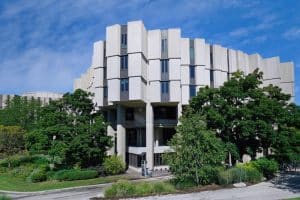A Glance at Northwestern Computer Science Program
Northwestern University, situated along the beautiful shores of Lake Michigan in Evanston, Illinois, was founded in 1851 by John Evans and eight other lawyers, businessmen, and Methodist leaders. As a premier institution, it has grown to twelve schools and colleges, housing numerous departments that have gained recognition nationally and internationally. Among these departments is the Northwestern Computer Science Department, part of Northwestern’s McCormick School of Engineering and Applied Science.
The department was established in the late 20th century, characterized by the rapid growth and expansion of computer science. Since its inception, the department has been committed to advancing knowledge in all areas of computer science and developing the next generation of leaders in the field.
The department’s mission is to create and disseminate knowledge in computer science through research and teaching of the highest quality, impacting both academia and industry. They strive to be innovative and interdisciplinary, maintaining strong collaborations with departments across the university.
With a diverse group of faculty members renowned in their respective fields, the department has made significant contributions to artificial intelligence, human-computer interaction, theoretical computer science, and database systems. The department offers undergraduate, graduate, and doctoral programs, each designed to equip computer science students with the necessary skills and knowledge to excel in the evolving field of computer science.
The curriculum is carefully crafted to foster critical thinking, creativity, and problem-solving abilities among the students. The department also provides numerous research opportunities, allowing students to participate in cutting-edge research under the mentorship of their world-class faculty.
Northwestern Programs for Computers Science
Undergraduate Program
Northwestern Computer Science Department offers two main undergraduate degrees: the Bachelor of Arts (BA) in Computer Science and the Bachelor of Science (BS) in Computer Science. The BA program provides a broad liberal arts education while equipping students with a strong foundational understanding of computer science.
This degree allows students to pair their computer science studies with interests in other fields, making it ideal for those seeking a more interdisciplinary approach. The BS program, on the other hand, is more intensive and technically focused, requiring additional computer science and mathematics courses. It’s designed for students who wish to delve deeper into the discipline, potentially pursuing graduate studies or a professional career in computer science.
Both Northwestern Programs share a core curriculum that includes key areas such as algorithms and data structures, computer systems, software construction, and the principles of programming languages. Elective courses explore various specialized areas, from artificial intelligence and machine learning to data science and human-computer interaction. These programs are specifically designed to provide computer science students with a comprehensive, flexible, and rigorous education in computer science, fostering critical thinking, creativity, and problem-solving skills.
Graduate Program
At the graduate level, Northwestern University’s Department of Computer Science offers both Master’s and Ph.D. programs. The Master’s program aims to provide computer science students with an advanced understanding of computer science, preparing them for careers in industry or further academic study. It combines a strong foundational curriculum with the flexibility to explore specialized areas of interest.
The computer science program typically takes two years to complete, depending if the student is studying full-time or part-time. The Ph.D. program, however, is a more intensive and research-focused degree. It’s designed for students who wish to contribute original, innovative research to the field of computer science, often leading to careers in academia or advanced positions in industry.
The duration of the Ph.D. program varies based on the individual student’s research progress but typically takes four to six years to complete. The Master’s and Ph.D. programs share a core curriculum covering foundational areas such as algorithms, computer systems, and software engineering. However, Ph.D. students also participate in research seminars and complete significant research projects under the guidance of a faculty advisor.
Interdisciplinary Programs
Recognizing the increasingly interdisciplinary nature of computer science, the Northwestern Computer Science Department offers several combined major and minor programs to facilitate the fusion of computer science with other fields of study. These programs allow students to integrate their interest in computer science with other academic or professional pursuits.
Combined majors often pair computer science with disciplines such as economics, music, or journalism, providing a unique blend of technical skills and domain-specific knowledge. For students primarily studying other subjects but wishing to gain a foundational understanding of computer science, Northwestern offers a minor in computer science that can complement nearly any major.
This minor includes key foundational courses in the field, allowing students to gain proficiency in programming, algorithms, and data structures. In addition to these, Northwestern University also offers certificate programs, which are typically more focused and industry-oriented than a minor. These certificate programs often cover emerging areas like data science, cyber security, and artificial intelligence, enabling students to stay at the forefront of industry trends and demands.
Northwestern Faculty and Research for computers science
Notable Faculty Members
Northwestern University’s Computer Science Department boasts a diverse faculty known for their excellence in both teaching and research. While it’s impossible to highlight everyone in a short paragraph, a few notable members include Professor Larry Birnbaum, a leader in the field of Artificial Intelligence and a co-director of the Northwestern Institute on Complex Systems.
Another notable Northwestern Faculty member is Professor Fabián Bustamante, who has significantly contributed to distributed systems and networking. Professor Simone Campanoni is known for his innovative work in compilers and computer architecture. Professor Josiah Hester focuses on energy harvesting and intermittent computing, pushing the boundaries of sustainable computing.
The faculty members at Northwestern contribute to the students’ academic growth and the broader field of computer science through their cutting-edge research and technological advancements. Their work spans various specialties, reflecting the department’s commitment to a comprehensive and forward-looking understanding of computer science.
Current Research Areas
Northwestern Computer Science Department is engaged in a wide range of research areas, reflecting the diversity and depth of the field. One major area of focus is Artificial Intelligence (AI), where faculty and students work on developing advanced machine learning algorithms, exploring AI ethics, and applying AI techniques in fields like healthcare and robotics.
Human-Computer Interaction (HCI) is another significant area of research, examining how people interact with technology and designing more intuitive and accessible systems. The department also excels in theoretical computer science, studying fundamental questions about the nature of computation and information.
Other research areas include database systems, where researchers work on designing more efficient and reliable methods for data storage and retrieval; computer systems, with a focus on improving the performance and security of both hardware and software; and network science, studying how information flows through complex systems like the internet or social networks.
Additionally, the department has strong research programs in graphics and visualization, programming languages, and cybersecurity. This wide array of research areas underscores Northwestern’s commitment to advancing knowledge across the breadth of computer science.
Recent Publications and Achievements
The department has consistently produced high-quality research published in prestigious computer science journals and conference proceedings. Faculty and students have significantly contributed to fields such as artificial intelligence, human-computer interaction, theoretical computer science, database systems, and more.
Achievements often include grants and funding awards from organizations such as the National Science Foundation (NSF), awards for papers presented at leading conferences, and faculty appointments to prominent editorial boards or professional societies. For the most accurate and recent information on publications and achievements, please refer to the official Northwestern University Computer Science Department website or individual faculty websites.
Research Centers and Labs
Northwestern Computer Science Department hosts and collaborates with various research centers and labs, each focusing on different areas of the field. The Segal Design Institute, for instance, is an interdisciplinary center that brings together researchers from computer science, engineering, and design to study and innovate in areas like human-computer interaction and design thinking.
The Northwestern Institute on Complex Systems (NICO) is another interdisciplinary research center where computer scientists work with researchers from other fields to study complex systems in areas ranging from social science to biology. The department also has numerous research labs focused on specific areas of computer science.
These include labs dedicated to artificial intelligence, machine learning, data science, cybersecurity, and more. These centers and labs provide spaces for collaborative and interdisciplinary research, fostering a vibrant and innovative research community within the department. They also provide students with opportunities to participate in cutting-edge research, working alongside faculty to advance knowledge in the field.
Northwestern facilities and resources
Libraries and Study Spaces
Northwestern University provides a rich array of libraries and study spaces to support students in their academic pursuits. The University Library, the main library on campus, boasts a vast collection of books, periodicals, and digital resources, along with various study spaces that accommodate individual and group study.
The Seeley G. Mudd Library is particularly relevant for computer science students as it is dedicated to science and engineering disciplines. It features state-of-the-art study spaces, collaborative work areas, and access to a wide range of specialized literature and resources in computer science.
Additionally, the university provides numerous other study spaces throughout the campus, from quiet study rooms to collaborative workspaces equipped with modern technology. These spaces are designed to foster a conducive learning environment, whether students are working on group projects, studying for exams, or conducting research.
Labs and Equipment
The Northwestern facilities have state-of-the-art labs and equipment to support teaching and research. These include computer labs with high-performance computing resources, providing students with the tools to code, design, and experiment.
The Northwestern Computer Science department also houses specialized labs for various research areas such as artificial intelligence, data science, and human-computer interaction. These labs are equipped with advanced hardware and software tools necessary for cutting-edge research and innovation. For instance, the robotics lab might feature a variety of robots and drone equipment, while the cybersecurity lab might provide secure servers and network monitoring tools.
Furthermore, students can access the university’s larger technical resources, including supercomputing clusters for high-performance computing tasks. Overall, the availability of these labs and equipment plays a crucial role in facilitating hands-on learning, innovation, and research in computer science.
Online Resources
Northwestern University’s Department of Computer Science offers various online resources to support student’s academic and research pursuits. These include access to online databases and digital libraries containing thousands of academic journals, e-books, and other scholarly materials relevant to computer science.
Through the university’s Learning Management System, students can access course materials, submit assignments, participate in discussion forums, and collaborate with peers. In addition, the department provides licenses for various software tools and platforms used in computer science, such as integrated development environments (IDEs), data analysis software, and cloud computing platforms.
The university also offers online tutoring and academic support services, helping students succeed in their courses. Furthermore, students can access career resources, including online job boards, career counseling appointments, and resume and cover letter writing resources. These online resources provide students with the tools and support they need to excel in their studies and research and to prepare for their future careers.
Northwestern Admission Process for Computer Science
Admission Requirements for Undergraduate Program
Admission to Northwestern University’s undergraduate computer science program is competitive and requires a strong academic record. Applicants are expected to have a solid foundation in high school-level mathematics, including algebra, geometry, and calculus courses, if available. Additionally, although not required, any prior coursework or experience in computer science could strengthen the application.
Prospective students must submit a completed application form, high school transcripts, letters of recommendation (typically from teachers or school counselors), and standardized test scores (if required by the university at the time of application). The application also requires an essay or personal statement where applicants can express their interest in computer science and why they wish to study at Northwestern.
Demonstrated extracurricular activities, leadership roles, or work experience can also enhance an application. International students may have additional requirements, such as English language proficiency test scores. As admission requirements can change, it is recommended that prospective students check the most recent requirements on the university’s official admissions website.
Admission Requirements for Graduate Program
Admission to Northwestern Computer Science graduate programs is selective and involves a rigorous evaluation process. Applicants must hold a bachelor’s degree from an accredited institution, and while a degree in computer science or a related field is typically preferred, it is not strictly required. Prospective students should demonstrate a strong academic record, particularly in quantitative areas such as mathematics and science.
The application process typically includes the submission of official transcripts, letters of recommendation (usually from professors or professionals familiar with the applicant’s academic or professional work), a statement of purpose detailing the applicant’s interest and goals in pursuing a graduate degree in computer science, and a resume or CV. Standardized test scores, such as the GRE, may also be required, although requirements can vary over time.
International applicants whose first language is not English must also demonstrate English proficiency, typically through a standardized test like the TOEFL or IELTS. Specific requirements can vary between the Master’s and Ph.D. programs and change over time, so prospective students should check the most recent requirements on the university’s official admissions website.
Financial Aid and Scholarships
Northwestern Computer Science is committed to making education affordable and offers a range of financial aid options to help students manage the cost of their studies. This aid can come through grants, scholarships, loans, and work-study opportunities. Grants and scholarships are forms of aid that do not need to be repaid and are awarded based on various factors, including financial need, academic merit, and extracurricular achievements.
The university also participates in federal and state loan programs. It offers a work-study program where students can work part-time on or off-campus to earn money to help pay for their education. In addition to university-wide financial aid, the Department of Computer Science may offer scholarships or fellowships specific to students in the program.
International students are also eligible for certain types of financial aid. Students are encouraged to submit a Free Application for Federal Student Aid (FAFSA) to be considered for need-based financial aid and to explore all available options to help finance their education. For the most accurate information, prospective students should refer to Northwestern’s official financial aid website.
Now that you have an idea about Northwestern Computer Science, your college admissions to that university should be next on your mind. To ensure that you get into Northwestern University, you can get help with AdmissionSight. With ten years of experience with college admission experts, AdmissionSight can help you get into Northwestern University. You can talk to our experts today to get an initial consultation.









































